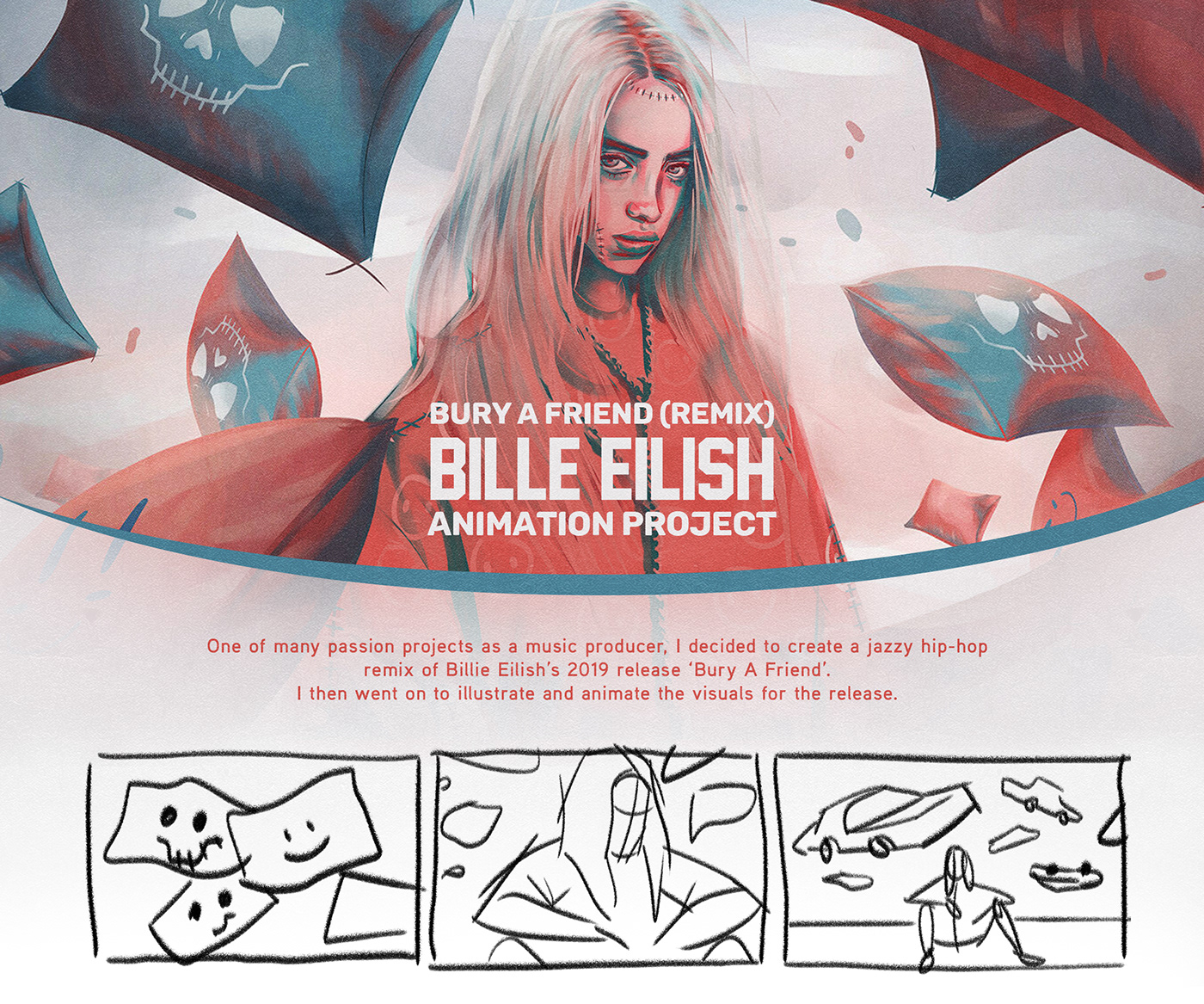In an era dominated by digital connectivity, are our cultural icons truly safe from the pervasive reach of the internet's darkest corners? The uncomfortable truth is that no one, not even celebrated artists like Billie Eilish, is immune to the unsettling phenomenon known as "Rule 34," and its implications demand a serious reckoning.
Billie Eilish, a name synonymous with boundary-pushing music and a distinctive aesthetic, has undeniably shaped contemporary youth culture. Her influence reverberates far beyond the realm of melodies and lyrics, extending into the spheres of fashion, mental health advocacy, and the very fabric of online interactions. She's a cultural force, a Gen Z icon who has captivated millions with her raw honesty and unapologetic individuality. However, this very fame casts a long shadow, making her a target in the often-lawless landscape of the internet. The phrase "Billie Eilish Rule 34" throws a stark light on this uncomfortable reality, forcing us to confront the complex issues of privacy, consent, and the ethical boundaries of online expression when applied to public figures, especially young women navigating the complexities of celebrity.
| Full Name | Billie Eilish Pirate Baird O'Connell |
| Birth Date | December 18, 2001 |
| Birth Place | Los Angeles, California, USA |
| Age | 22 years old (as of October 26, 2024) |
| Nationality | American |
| Occupation | Singer, Songwriter |
| Years Active | 2015present |
| Genres | Pop, alternative pop, electropop |
| Instruments | Vocals, Piano, Guitar, Ukulele |
| Labels | Darkroom, Interscope |
| Associated Acts | Finneas O'Connell |
| Awards | Numerous Grammy Awards, American Music Awards, Brit Awards, and more. |
| Official Website | Billie Eilish Official Website |
Billie Eilishs rise to stardom has been meteoric, and with that ascent comes intense scrutiny and, unfortunately, exploitation. She embodies a generation's angst and artistic spirit, making her a compelling subject for both admiration and, disturbingly, objectification. This juxtaposition is at the heart of the "Billie Eilish Rule 34" phenomenon. It highlights the inherent power imbalance that exists between celebrities and their audiences, particularly within the largely unregulated space of the internet. The creation and dissemination of explicit content featuring Billie Eilish, often without her consent or knowledge, underscores the challenges celebrities face in attempting to maintain control over their image and personal boundaries in the digital age. This is not just about one celebrity; it's a reflection of a broader societal issue.
- Mkvmoviespoint 2023 Your Ultimate Guide Latest Updates
- Ullu Web Series 2024 Mustwatch List Where To Stream
The internet, with its promise of boundless information and connection, also harbors a darker side a realm where anonymity emboldens individuals to engage in behaviors they might otherwise avoid. Rule 34, an internet adage stating that if something exists, there is pornography of it, exemplifies this troubling aspect of online culture. It's a cynical and often dehumanizing principle that disregards personal boundaries and fuels the creation and proliferation of non-consensual explicit content. For public figures like Billie Eilish, this means that their likeness, their image, and even aspects of their persona can be appropriated and manipulated to create content that is explicitly sexual in nature. The sheer volume and accessibility of this content are facilitated by the internets vast reach and the relative ease with which it can be shared across various platforms.
The concept of Rule 34 has become deeply ingrained in internet culture, acting as both a disturbing prediction and a self-fulfilling prophecy. The virality of such content is driven by a complex mix of factors, including shock value, the allure of the forbidden, and a general desensitization to sexual content. In the case of Billie Eilish, her unique style and youthful image may contribute to her being targeted. Her androgynous fashion choices and rejection of traditional female stereotypes have challenged societal norms, making her a figure of both fascination and, for some, a target for sexualization. The fact that she is a young woman only exacerbates these issues, raising concerns about the exploitation of minors and the objectification of female celebrities.
It's crucial to understand that the creation and consumption of "Billie Eilish Rule 34" content are not victimless acts. They have real-world consequences for the artist and contribute to a culture of online harassment and sexual exploitation. The emotional and psychological toll on the celebrity can be immense. Imagine the constant anxiety of knowing that your image is being used without your permission in explicit and degrading ways. This can lead to feelings of vulnerability, powerlessness, and a loss of control over ones own identity. Furthermore, the widespread availability of this content can shape public perception of the celebrity, potentially impacting their career and personal relationships.
- Aagmal Gives Inspiring Generosity Community Impact Today
- Filmyfly Filmywap Movie Downloads Is It Safe 2024 Guide
The motivations behind the creation of Rule 34 content are varied and complex. Some fans may create such content as a misguided form of admiration or artistic expression, blurring the lines between fandom and exploitation. Others may be driven by purely sexual desires, using the celebrity's image as a means of gratification without considering the ethical implications. Still others may engage in such behavior as a form of harassment or a way to exert power over the celebrity. Regardless of the motivation, the creation and dissemination of "Billie Eilish Rule 34" content constitutes a violation of her privacy and a breach of her personal boundaries.
The psychological and societal trends that fuel this unsettling trend are deeply rooted in the objectification of women, the normalization of online sexual harassment, and the erosion of privacy in the digital age. The internet provides a veil of anonymity that allows individuals to engage in behaviors they might otherwise avoid in the real world. This anonymity, coupled with the ease with which explicit content can be created and shared, creates a fertile ground for the proliferation of Rule 34 content. The lack of effective regulation and enforcement further exacerbates the problem, allowing perpetrators to operate with relative impunity.
The intersection of celebrity culture and Rule 34 highlights how celebrities are often targets of this type of content due to their high profile and constant media exposure. Because of their prominence, celebrities are frequently the subject of Rule 34. Their images are readily available online, making it easy for individuals to create and share explicit content featuring them. The widespread availability of celebrity images, combined with the anonymity of the internet, creates a perfect storm for the creation and dissemination of Rule 34 content. This is a troubling aspect of online culture that demands greater awareness and accountability.
The impact of Rule 34 on internet culture and fan engagement is significant. It can shape how fans interact with celebrities, blurring the lines between admiration and exploitation. The creation and sharing of explicit content can also create a hostile online environment for the celebrity and their fans. This can lead to a decline in fan engagement and a sense of alienation from the online community. It's crucial to promote responsible online behavior and to foster a culture of respect and consent.
Billie Eilish, as a public figure, has faced numerous challenges related to her image being used without permission in various forms of media. This is a common issue for celebrities who are constantly in the public eye. Their images are often used for commercial purposes without their consent, and they may also be targeted by individuals who seek to exploit their fame for personal gain. The unauthorized use of a celebrity's image can have serious legal and ethical implications, and it's important to protect the rights of public figures to control their own image.
Addressing the issue of "Billie Eilish Rule 34" requires a multi-faceted approach that includes raising awareness, promoting responsible online behavior, and implementing effective legal and regulatory frameworks. It's crucial to educate individuals about the ethical implications of creating and consuming Rule 34 content and to foster a culture of respect and consent. Social media platforms and online communities must also take responsibility for removing explicit content and holding perpetrators accountable for their actions. Furthermore, legal frameworks need to be updated to address the unique challenges posed by online sexual harassment and exploitation.
Understanding Rule 34 and its connection to Billie Eilish requires a responsible and ethical perspective. It's important to approach this topic with sensitivity and to avoid perpetuating harmful stereotypes or objectifying the celebrity. The goal should be to raise awareness about the issue and to promote healthy discussions around internet culture and celebrity representation. By exploring this topic, we aim to provide clarity and promote healthy discussions around internet culture and celebrity representation. This is not about sensationalizing the issue; it's about fostering a greater understanding of the challenges celebrities face in the digital age and promoting a more responsible and ethical online environment.
The world of the internet is vast and unpredictable, and among its myriad phenomena is something known as Rule 34. This rule posits that if something exists, there is pornography of it. This seemingly innocuous statement has profound implications for celebrities like Billie Eilish, who are constantly in the public eye and whose images are readily available online. The fact that Rule 34 exists and that it is often applied to celebrities underscores the need for greater awareness and accountability in the digital age.
Rule 34 "Billie Eilish" AI: understanding the controversy and its implications is crucial. The rise of artificial intelligence has further complicated the issue of Rule 34, as AI-generated content can be used to create even more realistic and explicit images of celebrities without their consent. This raises serious ethical concerns about the use of AI technology and the need for greater regulation. It's important to understand the potential risks of AI and to take steps to prevent its misuse.
The "Billie Eilish Rule 34" phenomenon reflects broader societal attitudes toward women, privacy, and body image. It's a symptom of a culture that often objectifies women and fails to respect their personal boundaries. Addressing this issue requires a fundamental shift in societal attitudes and a greater commitment to promoting equality and respect. It's important to challenge harmful stereotypes and to create a culture where women are valued for their contributions and not for their physical appearance.
While doing research to find examples of what artifacts would fall under kairos, I came across the popular singer Billie Eilish. This underscores the pervasive nature of celebrity culture and the way in which public figures are often used as examples or symbols in various contexts. The fact that Billie Eilish's name came up in the context of kairos highlights her cultural significance and the way in which she has become a symbol of a particular generation.
This article delves into the details of the incident, its implications, and the broader cultural context in which it occurred. It's important to understand the specific details of the "Billie Eilish Rule 34" phenomenon in order to fully grasp its significance. This includes understanding the origins of Rule 34, the motivations behind the creation of such content, and the impact it has on the celebrity and their fans. By delving into the details of this incident, we can gain a deeper understanding of the challenges celebrities face in the digital age and the need for greater awareness and accountability.
The "Billie Eilish Rule 34" phenomenon is a complex and multifaceted issue that demands serious attention. It raises important questions about privacy, consent, and the ethical boundaries of online expression. By exploring this topic, we can gain a deeper understanding of the challenges celebrities face in the digital age and promote a more responsible and ethical online environment. This is not just about one celebrity; it's about creating a culture where all individuals are treated with respect and dignity, both online and offline.
- Ullu Originals Exciting Web Series Avoiding No Results
- Erome Baby Beauty Exposed Photos Videos See It Here


:max_bytes(150000):strip_icc():focal(749x0:751x2)/billie-eilish-vogue-magazine-video-cover-010423-3-118ccf410478459694411746dcd1d10f.jpg)